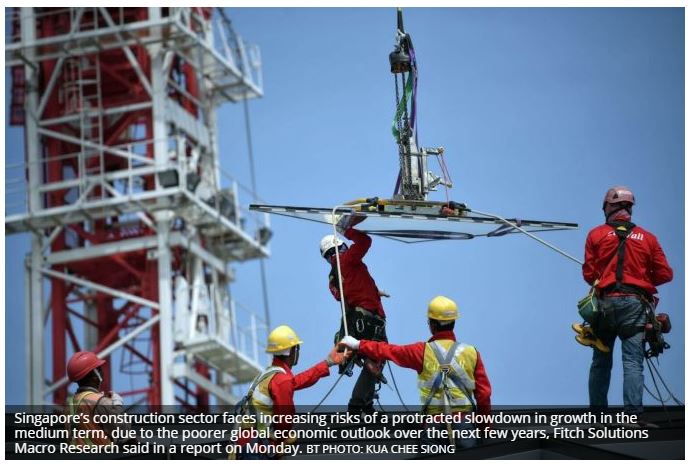Singapore’s construction sector may face protracted slowdown in medium term: Fitch
SINGAPORE’S construction sector faces increasing risks of a protracted slowdown in growth in the medium term, due to the poorer global economic outlook over the next few years, Fitch Solutions Macro Research said in a report on Monday.
The sector will see growth weakening to 2.7 per cent in 2020 and 0.5 per cent in 2021 in real terms, Fitch said.
However, in the short term, the construction sector is likely to grow by 3 per cent, supported by an expected short-term stronger performance in the buildings sector.
The research firm on Monday adjusted its short-term growth outlook for the construction sector, up from its previous 2.8 per cent forecast for 2019, after it had also made upward revisions of its forecasts for the residential and non-residential buildings sector in Singapore.
The buildings sector accounts for some 70 per cent of the total value of the construction industry, Fitch said. On July 10, the company said the buildings sector will grow at 3.2 per cent this year and 2.3 per cent in 2020.
“Despite the implementation of property cooling measures in H2 2018, the private residential property index hit a five-year high in Q2 2019, suggesting that it will take a long time for effects of the cooling measures to fully kick in,” Fitch said in its report.
Along with the uptick in the supply of buildings observed in 2018, Fitch expects stronger growth in the buildings sector, which will lift the construction sector as a whole.
Another factor boosting the short-term growth of the construction sector is the construction of Singapore’s largest road project, the North-South Corridor, which is set to start by the end of the year.
In the medium term, the construction sector is expected to face external headwinds from the likely slowdown in growth of the global economy, Fitch noted.
The elevated risks of a global recession over the coming quarters and the uncertainty in markets will dampen demand of residential, commercial, industrial and retail space, resulting in a slowdown in the buildings sector, Fitch said on Monday.
Over the next decade, average annual growth of the construction sector is expected to be at 2.8 per cent through 2028.
A steady pipeline of transport megaprojects will contribute to the long-term recovery of the sector’s pace of growth, Fitch noted.
Compared to the transport sector, however, the energy and utilities sector will see fewer opportunities, “given the country’s already well-developed stock of existing power infrastructure”, it added.
There are currently 75 transport projects in the pipeline in Singapore, compared to only 19 in the energy and utilities sector, according to Fitch’s Infrastructure Key Projects Database.
Over the next decade, the infrastructure sector – in particular, the transport sector – will act as a cushion to the cyclical slowdown in the buildings sector, Fitch said.
This is supported by Singapore’s large project pipeline, with megaprojects such as the Changi Airport Terminal 5 and North-South Corridor Expressway projects starting construction over the next few years.
More recently, the Land Transport Master Plan 2040 was released by the Land Transport Authority of Singapore, reaffirming the government’s plans to expand the current rail network from the current 229 kilometres (km) to more than 360km by 2040, with the planned construction of new lines such as the Jurong Region Line and the Cross-Island Line.
Also, in line with Singapore’s car-lite vision, authorities plan to expand the current cycling network from 440km to more than 1,000km over the next decade.
“We expect contracts for these initiatives to be progressively rolled out, providing opportunities in civil engineering and boosting the domestic construction industry,” Fitch said.
Fitch Solutions Macro Research is a unit of Fitch Group.
Source: https://www.businesstimes.com.sg/government-economy/singapore%E2%80%99s-construction-sector-may-face-protracted-slowdown-in-medium-term-fitch


 English
English






